The Deep South
Southern Charm and Hospitality
The "Deep South" region of the United States is considered a subregion of the Southeast, which there is some overlap between the two, the deep south typically includes Alabama, Georgia, Louisiana, Mississippi and South Carolina. The Deep South carries a distinct identity that is deeply rooted in its historical significance, unique traditions, and warm hospitality. From the plantations that tell stories of a tumultuous past to the soulful melodies of blues and jazz that emanate from its cities, the Deep South offers a captivating tapestry of experiences that continue to shape the region's identity.
Louisiana Vacation:
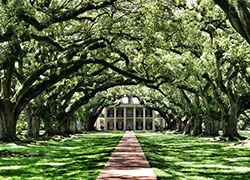
Photo by Dirk Spijkers / Unsplash | Take a tour of picturesque antebellum plantations, such as the beautiful Oak Alley plantation located in Vacherie, Louisiana (about 50 miles west of New Orleans). Oak Alley has a connection to the institution of slavery, which played a significant role in shaping the plantation's history. It provides an opportunity for visitors to learn about the complex and often painful dynamics of the plantation system and gain a deeper understanding of the lives of both the owners and the enslaved individuals who lived and worked there.
|
New Orleans Vacation:
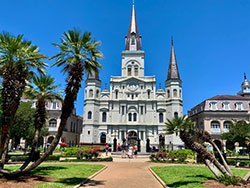
Photo by Steve Lussier / Unsplash | Also known as "The Big Easy" - New Orleans, is an exciting destination with a fascinating blend of cultures and history. Enjoy the lively music scene, mouthwatering Cajun and Creole cuisine, and colorful festivals like Mardi Gras. Explore the famous French Quarter, with its historic streets, iconic landmarks, and the bustling atmosphere of Jackson Square.
|
| Experience soulful jazz at venues like Preservation Hall, take a leisurely stroll along the Mississippi Riverfront, explore the charming Garden District. New Orleans offers the opportunity to experience fascinating history, jazz music, tasty cuisine, and Southern hospitality. |
Delve into the rich history of Montgomery, Alabama, and visit significant civil rights landmarks, including the Rosa Parks Museum and the National Memorial for Peace and Justice.
Alabama:
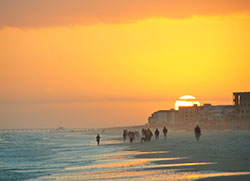
Photo by Simion / Adobe Stock | Orange Beach and Gulf Shores are two popular beach towns located in the southwest corner of Alabama. They offer beautiful beaches, mild weather, and a variety of activities and amenities, including golfing, fishing, shopping, and dining. The Gulf Shores Golf Club and Craft Farms Golf Resort offer picturesque fairways, scenic views, and well-maintained greens for an enjoyable golfing experience.
|
| You can enjoy dining on shrimp, oysters, crab, and catfish with hushpuppies. Alabama is also known for its barbecue including ribs, pulled pork, and brisket. Explore the Bon Secour National Wildlife Refuge, a 7,000-acre protected area that provides habitat for endangered species and is a prime spot for bird watching and hiking. You can spot migratory birds, sea turtles, and other wildlife. Enjoy a dolphin-watching cruise and witness these majestic creatures in their natural habitat. Several tour operators offer guided boat trips that allow you to observe dolphins as they play and swim alongside the vessel. |
Birmingham, Alabama
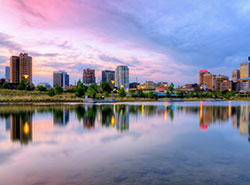
Photo by Zach Farmer / Unsplash | Birmingham seamlessly blends its rich history and vibrant culture. With notable landmarks like the Civil Rights Institute, visitors can explore the significant role Birmingham played in the Civil Rights Movement, gaining insights into the struggles and triumphs of that era. Visit Vulcan Park and Museum set atop Red Mountain, offering panoramic views of the city skyline while showcasing Birmingham's industrial heritage.
|
| For outdoor enthusiasts, there are ample opportunities to engage in activities such as hiking through picturesque trails, biking along scenic paths, and casting a line for fishing enthusiasts. Birmingham truly captivates visitors with its compelling history, cultural attractions, and the chance to immerse oneself in the natural beauty that surrounds the city. |
Montgomery, Alabama
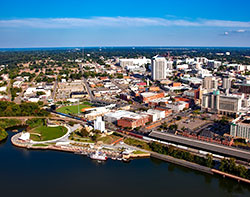
Photo by Simion / Adobe Stock | Montgomery, the capital of Alabama, is a city steeped in history and culture. It proudly showcases significant landmarks like the Alabama State Capitol, where pivotal events in the Civil Rights Movement took place. Visitors can explore the rich heritage of the city through poignant sites like the Civil Rights Memorial and the Rosa Parks Museum, paying homage to the brave individuals who fought for equality.
|
| Montgomery's historical charm extends to attractions like the Old Alabama Town, where you can step back in time and experience life in the 19th century through preserved homes and buildings. For music enthusiasts, the Hank Williams Museum is a must-visit, offering a glimpse into the life and legacy of one of country music's greatest icons. Montgomery stands as a testament to the transformative events that have shaped Alabama's history, inviting visitors to immerse themselves in its compelling story. |
Best Time to Visit:
The Deep South states offer a mix of climates, but generally, the best time to visit is during Spring (March to May) and Fall (September to November).
Spring (March to May):
Spring brings pleasant temperatures and blooming landscapes to the Deep South. It's an ideal time to explore cities like New Orleans, Charleston, and Savannah, where you can enjoy cultural attractions, historic sites, and vibrant festivals. The average temperature ranges between 60°F to 80°F (15°C to 27°C), making it comfortable for outdoor activities and sightseeing.
Summer (June to August):
Summers in the Deep South can be hot and humid, with temperatures ranging from 80°F to 95°F (27°C to 35°C). However, if you're comfortable with the heat, you can enjoy the lively atmosphere and unique cultural experiences. Coastal areas like Myrtle Beach in South Carolina and Gulf Shores in Alabama are popular destinations for beach lovers. Remember to stay hydrated and seek indoor attractions or shade during the hottest parts of the day.
Fall (September to November):
Fall in the Deep South brings mild temperatures, colorful foliage, and fewer crowds. It's a fantastic time to visit places like the Great Smoky Mountains in Tennessee and North Carolina, where you can witness stunning fall foliage. The average temperature ranges between 60°F to 80°F (15°C to 27°C), providing pleasant weather for outdoor explorations, coastal visits, and enjoying local cuisine.
Winter (December to February):
Winter in the Deep South is generally mild compared to other regions in the United States. The average temperature ranges between 40°F to 60°F (4°C to 15°C). While it may be cooler, it's still a great time to visit cities like New Orleans, where you can explore historic neighborhoods, indulge in delicious cuisine, and experience the festive atmosphere of Mardi Gras. Outdoor activities such as hiking and golfing are also possible during the winter months in the Deep South states
Hurricane Season:Hurricane season in the Deep South typically runs from June 1st to November 30th, with the peak activity occurring between August and October. During this time, the Gulf Coast states of Louisiana, Mississippi, Alabama, and the western parts of Florida are particularly vulnerable to hurricanes. When planning your travel, check the weather forecast for the area before departing to ensure your trip is not likely to be impacted.
Travel Planning Tips:
Plan Ahead: Research and plan your itinerary in advance to make the most of your time in the Deep South region of the U.S. Consider the specific states and attractions you want to visit, the duration of your stay, and any seasonal events or festivals you'd like to experience.
Cash and Currency: The currency used in the United States, including the Deep South is the U.S. Dollar ($). Make sure to have some cash on hand for small expenses, as not all places may accept credit cards, especially in remote areas.
Travel Insurance: Ensure that you have comprehensive travel insurance that covers medical expenses, trip cancellation, and any potential emergencies. Review the policy details and know how to access medical assistance if needed, as healthcare systems may vary between states.
Language, Local Customs and Etiquette: English is the primary language spoken in the Deep South. It's always good form to be patient, polite and respectful of local customs and traditions. Be culturally sensitive as to how you approach inquiring about the history of the region as some may be uncomfrtable discussing the painful past.
Stay Hydrated:Whether you're exploring urban areas or enjoying outdoor activities, it's essential to stay hydrated. Carry a water bottle and drink plenty of fluids, especially during the hot and humid summer months.
Sun Protection:The Deep South region of the U.S. can have sunny and hot summers, so it's crucial to protect yourself from the sun. Wear sunscreen, a hat, and sunglasses, and seek shade during the hottest hours of the day to prevent sunburn and heat-related issues.
Mosquito Repellent To minimize mosquito bites in the Deep South, especially during warmer months, it's advisable to use mosquito repellent containing DEET or other effective ingredients and apply it to exposed skin and clothing.
Travel Documents: Ensure you have a valid passport if you're an international traveler. Check if you require a visa to enter the United States, depending on your nationality, and make sure you have all the necessary travel documents. It's also a good idea to familiarize yourself with the customs and immigration procedures of the United States.
Accommodations:
The Deep South region offers a wide range of accommodation options, including historic mansions, hotels, vacation rentals, bed and breakfast establishments and resorts. Book in advance, especially during peak seasons, to secure the best deals and availability.
Transportation:
The Deep South region of the United States offers a variety of transportation options to facilitate travel for retirees exploring the area. Whether you're venturing through the bustling cities or the picturesque countryside, you can choose from various modes of transportation based on your preferences and the distances you plan to cover.
- Domestic Flights: Major airports serve the Deep South area, including Hartsfield-Jackson Atlanta International Airport in Georgia, Louis Armstrong New Orleans International Airport in Louisiana, and Charleston International Airport in South Carolina. Retirees can choose from various airlines, such as American Airlines, Delta Air Lines, United Airlines, and Southwest Airlines, which offer domestic flights connecting major cities within the region. These flights provide a time-saving option for retirees who want to reach their desired destinations quickly without spending excessive time on the road.
- Trains: While train options are not as extensive in the Deep South as in other regions, Amtrak provides some services within the area. The Crescent route, for example, connects cities like Atlanta, Georgia; New Orleans, Louisiana; and Birmingham, Alabama. Retirees can enjoy comfortable and scenic journeys with amenities such as spacious seating, Wi-Fi, and onboard dining.
- Buses: Intercity bus services, including Greyhound and Megabus, operate within the Deep South, providing cost-effective transportation options for retirees. Buses offer flexibility and multiple departure times, making it convenient to travel between cities and towns. Retirees can appreciate the ease of direct routes and drop-off points in city centers.
- Rental Cars: Renting a car is a popular choice for retirees who prefer independent exploration in the Deep South. With picturesque landscapes and charming towns, having a car allows retirees to venture off the beaten path and customize their itineraries. Rental car agencies are available at major airports and city centers, providing a range of vehicle options to suit different needs.
- Taxis: Taxis are widely available in urban areas throughout the Deep South. Retirees can hail taxis on the street or find designated taxi stands. Additionally, ride-sharing apps like Uber and Lyft are prevalent, offering convenient and reliable transportation options with cashless payments and the ability to track the arrival of your ride.
- Public Transportation:
Major cities in the Deep South, such as Atlanta, New Orleans, and Charleston, have comprehensive public transportation systems that include subways, buses, and trams. Retirees can utilize travel cards or purchase individual tickets to navigate these efficient networks, providing easy access to attractions, shopping, and dining without the need for a car.
Safety Tips:
- Safety Precautions:
Traveling to any destination requires taking certain safety precautions, and the Deep South region of the United States is no exception. Here are some safety tips to consider when traveling to the Deep South:
- Secure Accommodations: Choose reputable accommodations in safe neighborhoods or areas with positive reviews. Ensure your lodging has proper security measures in place, such as reliable locks and surveillance systems.
- Blend In: Dress and behave like a local to avoid standing out as a tourist. This can help reduce the chances of becoming a target for criminals. Respect local customs and traditions while being mindful of your surroundings.
- Personal Belongings: Keep your valuables, including passports, cash, and electronics, secure at all times. Consider using a money belt or a concealed pouch to carry your important documents and money. Avoid displaying expensive jewelry or carrying large sums of cash. Don't leave valuables in your parked car.
- Stay Alert in Public Spaces: Be vigilant in crowded areas, such as tourist attractions, markets, and public transportation hubs. Keep an eye on your belongings and be cautious of pickpockets. Trust your instincts and remove yourself from any situation that feels unsafe.
- Stay Connected: Keep your family and friends informed about your travel plans. Regularly update them on your whereabouts and schedule, especially if you are traveling alone.
- Mosquito Repellent To minimize mosquito bites in the Deep South, especially during warmer months, it's advisable to use mosquito repellent containing DEET or other effective ingredients and apply it to exposed skin and clothing. Mosquitoes are most active during dawn and dusk, and are commonly found in areas with stagnant water, such as marshes, swamps, and near rivers or lakes, as well as in gardens, parks, and wooded areas. The best time to avoid mosquito bites is during the cooler months, but it's important to remain vigilant as mosquitoes can still be present. Wear long sleeves, long pants, and socks can provide additional protection.
- Avoiding Alligators Alligators are present in some areas in the Deep South, such as swamps, ponds, rivers or lakes. Observe them from a safe distance, ideally from a viewing platform and stay at least 20-30 feet away adult alligators and even farther for larger ones. Avoid approaching or provoking them in any way and never feed them. When near bodies of water where alligators may be present, keep your pets on a leash and under control. Small pets can resemble prey to alligators and should be kept away from the water's edge.
- Vaccinations: Before visiting the Deep South, it's recommended to check with your healthcare provider or travel clinic about any recommended vaccinations. Routine vaccines such as COVID-19, measles-mumps-rubella (MMR), tetanus, pertussis (DTaP), varicella (chickenpox), and flu shots are generally advised. Depending on your travel plans and personal health, additional vaccines like hepatitis A and B may be recommended.
- Medical Facilities: Familiarize yourself with the location of medical facilities, clinics, and hospitals near your travel destinations in Greece. Keep a list of emergency contact numbers and addresses readily available.
- Prescription Medications:If you take prescription medications, ensure you have an ample supply for the duration of your trip. Carry them in their original packaging, along with copies of prescriptions, in case you need to refill or replace them while in Greece.
- Hygiene and Food Safety: Practice good hygiene by regularly washing your hands with soap and water, especially before eating or touching your face. When handwashing facilities are not available, use hand sanitizer with at least 60% alcohol content.
- Sun Protection: The Deep South can experience high sun exposure, particularly during the summer months. Protect yourself from the sun's harmful rays by wearing sunscreen with a high SPF, a wide-brimmed hat, sunglasses, and lightweight clothing that covers your skin. Seek shade or indoor areas during the hottest hours of the day to avoid heat-related issues and sunburn.
- Stay Hydrated: Maintain adequate hydration by drinking plenty of water, especially in warmer months or when participating in outdoor activities. Carry a refillable water bottle and make a habit of drinking water throughout the day to stay hydrated.
- Emergency Numbers: Familiarize yourself with the emergency contact numbers in the Deep South, including the general emergency number (911), local police, and medical services.
- Travel Advisories Stay updated on current events, local regulations, and any travel advisories when traveling abroad. Visit the US Government State Department Travel Advisories web site to check on the status of your destination.
- Enroll in the STEP Program: Travelers are also urged to enroll in the U.S. State Department's Smart Traveler Enrollment Program (STEP) to receive security messages and to make it easier to locate them in an emergency. The Department uses these security messages to convey information about terrorist threats, security incidents, planned demonstrations, natural disasters, etc. In an emergency, please contact the nearest U.S. Embassy or consulate or call the following numbers: 1 (888) 407-4747 (toll-free in the United States and Canada) or 1 (202) 501-4444 from other countries.
| |
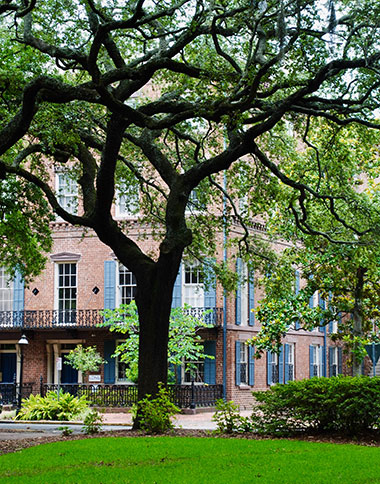 Savannah architecture
Photo by Alix Greenman / Unsplash
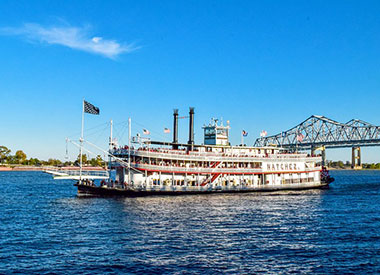 Steamboat on the Mississippi Photo by Charlotte / Pixabay
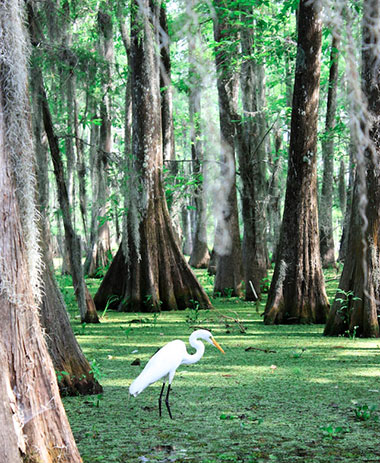 Lake Martin, Louisiana
Photo by Morgane Perraud / Unsplash
|
 Savannah architecture
Savannah architecture Steamboat on the Mississippi
Steamboat on the Mississippi Lake Martin, Louisiana
Lake Martin, Louisiana